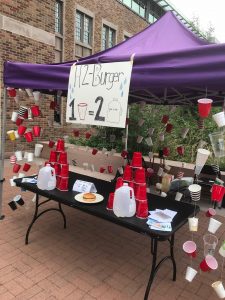After finishing the action project there are multitude of learning experiences that I extracted from the month of work and preparation. I learned that planning a project is rather easy, but coordinating the logistics to ensure that your vision comes to life can be much more difficult than anticipated. Collective action is vital to creating the systemic change that our society is in need of, but can be extremely difficult to garner, even on the small scale of the action project that my group accomplished. I learned that these staying organized, making use of resources, and constant communication with group members was really useful when pulling the project together.
For our action project, which was centered around meat, we decided to create an art installation comprised of disposable cups found on campus. These cups would represent the amount of water that goes into a single quarter pound beef patty. We collected 225 cups. Each cup was equivalent to two gallons of water. If you do the math, that is 450 gallons of water. We wanted our project to stimulate and even overwhelm the senses of people who engaged with our project, instead of simply handing out pamphlets or showing a documentary to community members. I was really happy with the outcome of project. Through all of the hiccups, we were able to pull together a great installation and informational brochure to accompany it. Those who passed by and engaged with our project were really receptive of our information and engaged in lively discussions. We were even able to captivate the attention of the director of University of Washington Dining Services, who conversed with us as well as informed us of some of the future changes we can expect to see with University of Washington Dining.
Our action project connected on many levels with the course material. The systems thinking we engaged with to grapple with the concepts in lecture was made of use for our project in order to assess impacts and solutions. Beef production are global drivers to water scarcity, climate change, land degradation, fossil fuel dependency, worker inequality, and equity issues. All of these topics were touched on throughout the duration of the course. We offered solutions, similar to how Pollan offers solutions, that did not push any specific agenda, but rather informed community members of the impacts that their potential food choices can implicate. We advised to try to reduce beef consumption instead of pushing an agenda of veganism or vegetarianism.

